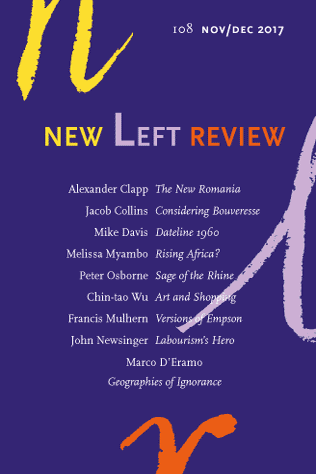After 2017’s mass anti-corruption protests, Alexander Clapp sets Romania’s sui generis political system in the context of its longue durée. Peculiarities of Iron Guard fascism and Ceauşescu’s West-oriented, Kim Il-sung-inflected Communism, deep state and external influence, crumbling infrastructure and Europe’s most vital cultural scene.
De-exoticization of the faraway in the age of inter-continental travel, matched by growing blanks in the map of national space. Marco D’Eramo on the selective epistemologies of globalization.
Politico-philosophical profile of Jacques Bouveresse, close friend and colleague of Bourdieu, examining the relation of his large, idiosyncratic body of work to the French philosophical traditions it explicitly disavows. Can thinkers as divergent as Wittgenstein, Musil and Kraus be mobilized to provide a coherent and countervailing ‘Kakanian’ tradition?
Global-city status is the new grail of competitive modernity. Can the hipsterfication model spearheaded in Brooklyn’s dumbo district be replicated in the harsher conditions of downtown Johannesburg—and if so, at what price?
Prelude to the explosive struggles of the sixties in California, as the social actors, left and right, gather in the wings. Black student militants, white aerospace workers, City developers, RAND Corps dropouts, Latino activists—and Lena Horne, taking direct action against racism in Beverley Hills.
After the debate on value-setting between Luc Boltanski, Arnaud Esquerre and Nancy Fraser in NLR 106, Chin-tao Wu examines relations between the luxury industry and high art. Why are James Turrell, Daniel Buren and Olafur Eliasson producing works for Louis Vuitton and Chanel?
Peter Osborne on Stefan Müller-Doohm, Habermas: A Biography. Life and times of the Eurozone’s most decorated philosopher.
Francis Mulhern on Michael Wood, On Empson. Reclaiming the heterodox thinker for literary criticism.
John Newsinger on John Bew, Citizen Clem. Hawkish celebration of Labourism’s post-war hero.
